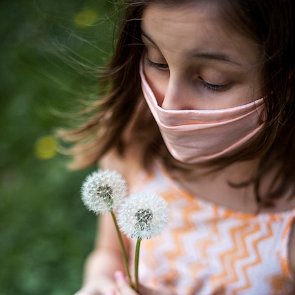5 Tips for Treating and Preventing Skin Irritation Caused by Wearing Face Masks
 Wearing a face mask is essential for protecting yourself and people around you from the novel coronavirus. Unfortunately, friction and increased humidity caused by wearing a mask can result in skin irritation and aggravate existing skin conditions. Since you can’t not wear a mask, you should know how to treat skin irritation caused by wearing it and prevent its recurrence.
Wearing a face mask is essential for protecting yourself and people around you from the novel coronavirus. Unfortunately, friction and increased humidity caused by wearing a mask can result in skin irritation and aggravate existing skin conditions. Since you can’t not wear a mask, you should know how to treat skin irritation caused by wearing it and prevent its recurrence.Choose Your Mask Wisely
One of the main causes of skin irritation is a poor choice of fabric for your mask. Synthetic fabrics are less breathable than cotton ones; because of it, moisture from your breath accumulates under the mask, making your skin more susceptible to irritation and breakouts. To prevent a moist environment under the mask and reduce friction, opt for soft masks made of cotton. However, you should keep in mind that breathable fabrics may let the virus in, so make sure that your mask is made of tightly woven cotton and has several layers.
It you’re wearing a reusable fabric mask (no matter whether you bought it or made it yourself), wash it and then iron it on the inside before putting it on.
Check this out: 5 Tips for Preventing Skin Breakouts While Traveling
Ditch Makeup
Firstly, why even bother if no one can see your face under the mask? Secondly, the mask will rub against your skin and get ruined with foundation, because it’s very hard to get off. Third, because of the humid environment under the mask, the foundation will clog your pores, resulting in breakouts. So, you should really ditch your foundation if you want your skin to remain healthy and breakout-free. If you need makeup to boost your mood and self-esteem, opt for a killer eye shadow.
Check this out: 5 Situations When You Should Definitely Ditch Makeup
Wash Your Face After Wearing a Mask, But Don’t Overdo It
As soon as you take off your mask, wash your hands, and then wash your face with a mild, neutral cleanser to remove dirt, sweat and excess skin oil. While it may be tempting to use strong cleansers to keep your skin breakout-free, now is the time to be more gentle to your skin than ever. Harsh surfactants, exfoliating products and alcohol-based toners will only aggravate irritation. And please, don’t use soap to wash your skin, since it will disturb your skin’s natural pH level. Rubbing your face with a towel is also a no-no; to prevent irritation, you should gently pat it dry.
Check this out: 5 Ingredients to Avoid in Your Face Wash
Moisturize, Moisturize, Moisturize
Moisturizing is one of the most important steps of any skincare routine, but if you wear a face mask often, it’s even more important. After washing your face, apply a gentle, hypoallergenic moisturizer that will keep your skin hydrated. Opt for products with a light texture and soothing ingredients, such as bisabolol, allantoin, panthenol, aloe vera extract, chamomile extract, green tea extract, etc.
Check this out: How to Pick the Right Moisturizer for Your Skin Type
Use Topical Products to Target Specific Problems
If your skin is prone to irritation, try applying a thick barrier cream to the areas of your face where you mask makes the most contact with your skin before putting on a mask. This should prevent friction and abrasion. If you’re developing flaking, redness, rashes, or other signs of irritation, apply a soothing balm or another calming product (for example, aloe vera gel) after washing your face. If you’re breaking out, use a spot treatment with zinc oxide, salicylic acid, copper or other anti-acne ingredients to get rid of pimples and prevent acne scars.
Check this out: 5 DIY Face Masks for Clear Skin
Breadcrumbs
Filters
- Face
Tags